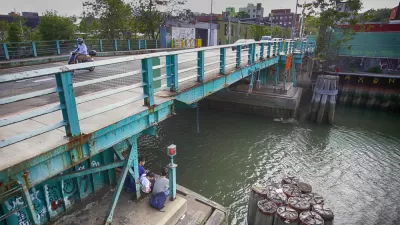After 10 years in operation, the Neighborhood Council system in L.A. represents a great deal of unfulfilled potential, say City Councilmember Paul Krekorian. With that, and the city's dire financial straits in mind, Krekorian is proposing reforms.
Neighborhood Councils are one of the more official avenues for neighborhood stakeholders to provide feedback about development in Los Angeles. Councilmember Krekorian discusses the Neighborhood Council system as well as the development reform effort recently announced in Los Angeles in this interview.
On Neighborhood Councils:
"About ten years into this, the neighborhood council movement has evolved. When it began, it was an effort to organize communities and give them a voice. Now, a decade into the process, we have 95 organized neighborhood councils throughout the city. We have passed the point of launching a new experiment in neighborhood democracy. We're now at a point of figuring out how to make the vibrant, robust neighborhood council process even better."
"There is a strong sense among almost all neighborhood councils that despite their advocacy for their communities, despite their volunteerism, and despite the passion and energy that they bring to this city, too often the power structure of the city neglects to take their views into account."
On development process reform:
"Everyone agrees we need to fast-track the process. At the end of that process, we won't necessarily expedite getting to "yes." We might also expedite getting to "no." The arbitrariness and inefficiency of the process aggravates developers, communities, and just about everybody. Business people and developers would rather have a fast "no" than a long, delayed "yes.""
"Unfortunately, most of the heavy lifting of this effort is going to require additional funding, for example, to create uniformity in the computer systems used by the various departments. As you pointed out, updating community plans and specific plans will take substantial investment, which we're not able to make right now."
Thanks to James Brasuell
FULL STORY: L.A. Councilmember Krekorian Proposes Reforms to Neighborhood Council System

Planetizen Federal Action Tracker
A weekly monitor of how Trump’s orders and actions are impacting planners and planning in America.

Maui's Vacation Rental Debate Turns Ugly
Verbal attacks, misinformation campaigns and fistfights plague a high-stakes debate to convert thousands of vacation rentals into long-term housing.

Restaurant Patios Were a Pandemic Win — Why Were They so Hard to Keep?
Social distancing requirements and changes in travel patterns prompted cities to pilot new uses for street and sidewalk space. Then it got complicated.

In California Battle of Housing vs. Environment, Housing Just Won
A new state law significantly limits the power of CEQA, an environmental review law that served as a powerful tool for blocking new development.

Boulder Eliminates Parking Minimums Citywide
Officials estimate the cost of building a single underground parking space at up to $100,000.

Orange County, Florida Adopts Largest US “Sprawl Repair” Code
The ‘Orange Code’ seeks to rectify decades of sprawl-inducing, car-oriented development.
Urban Design for Planners 1: Software Tools
This six-course series explores essential urban design concepts using open source software and equips planners with the tools they need to participate fully in the urban design process.
Planning for Universal Design
Learn the tools for implementing Universal Design in planning regulations.
Heyer Gruel & Associates PA
JM Goldson LLC
Custer County Colorado
City of Camden Redevelopment Agency
City of Astoria
Transportation Research & Education Center (TREC) at Portland State University
Jefferson Parish Government
Camden Redevelopment Agency
City of Claremont





























